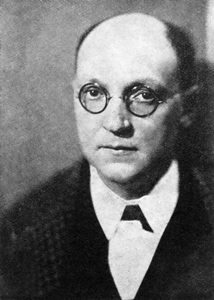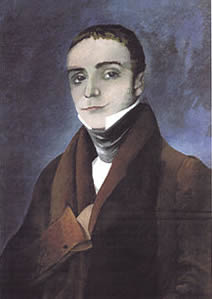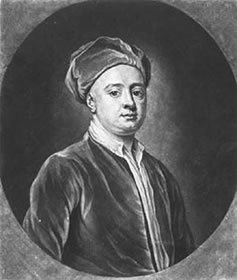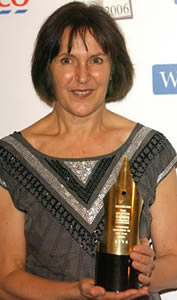De Kameroense schrijver Mongo Beti (eig. Alexandre Biyidi) werd geboren op 30 juni 1932 in Mbalmayo, een klein dorp ten zuiden van Yaoundé. Zie ook alle tags voor Mongo Betiop dit blog.
Uit: Le Rebelle I
« Réalisme et progressisme Comment se comporte le maître pris à contre-pied par de brusque mutations extérieures politiques, idéologiques ou religieuses qui contraignent tout d’un coup à rendre leur liberté à ses esclaves ? D’abord, il fait apparemment bonne figure, s’efforce de s’accommoder de la nouvelle situation et même d’y adhérer avec ferveur ; cela dure ce que cela dure. Mais bientôt les vieux instincts reviennent en force tourmenter consciemment ou inconsciemment notre héros ; le doute l’assaille. Après tout, pourquoi la liberté des esclaves ? Est-elle vraiment conforme au destin ? Et si elle était réprouvée par l’ordre profond du monde, c’est-à-dire par la nature. »
De Franse dichter, romanschrijver en essayist Georges Duhamel werd geboren op 30 juni 1884 in Parijs. Zie ook alle tags voor Georges Duhamelop dit blog.
Je les ai vus, ces deux Cerisiers…
« Comme vous voilà fait, mon cher ! » disait le cerisier stérile à son voisin de verger, le cerisier fécond. « C’est vrai, gronda le bon arbre, je suis bien obligé de reconnaître qu’ils m’ont mal payé de ma peine.
Pendant tout le mois de juin, le prodigue avait donné par milliers ses fruits admirables. Ses membres pendaient, accablés. Ses feuilles jonchaient le sol. Un odieux épouvantail ricanait dans la ramure. Une échelle attestait encore le passage des pillards. Maintes branches brisées offraient, en plein cœur de juillet, la triste image de novembre. L’herbe, alentour, était flétrie, la terre morose et battue.
« Voyez-moi, » fit l’arbre stérile. « Depuis l’origine des temps, j’observe la même prudence et je suis la même conduite. Je ne donne pas quatre cerises. Alors on me laisse en paix. Je suis sain et vigoureux. Mon feuillage n’a pas une tache, mon écorce pas une blessure. A bon entendeur, salut ! Mais taisons-nous, car voici notre maître.
Le maître, en effet, passait, regardant chacun des arbres. « Je vois, dit-il, un cerisier qui ne donne jamais de cerises. Nous finirons par le couper et nous ferons du moins quelque chose de son bois, une armoire ou une huche. »
« Diable ! » dit en tremblant le bon arbre, dès que le maître fut parti, « vous ne croyez pas préférable de prendre un petit peu de peine et de souffrir quelque disgrâce ? Ce que le maître a dit me semble effrayant pour vous. »
« Bah ! Bah ! » répondit l’autre, « ne vous tracassez pas trop. Il dit cela tous les ans. Mais il n’en fera jamais rien. Je suis bien trop nécessaire à l’ordonnance de l’allée.

Georges Duhamel (30 juni 1884 – 13 april 1966)
In 1930
De Engelse dichter Thomas Lovell Beddoes werd geboren op 30 juni 1803 in Clifton. Zie ook alle tags voor Thomas Lovell Beddoes op dit blog.
Old Adam, the Carrion Crow
Old Adam, the carrion crow,
The old crow of Cairo;
He sat in the shower, and let it flow
Under his tail and over his crest;
And through every feather
Leak’d the wet weather;
And the bough swung under his nest;
For his beak it was heavy with marrow.
Is that the wind dying? O no;
It’s only two devils, that blow,
Through a murderer’s bones, to and fro,
In the ghosts’ moonshine.
Ho! Eve, my grey carrion wife,
When we have supped on king’s marrow,
Where shall we drink and make merry our life?
Our nest it is queen Cleopatra’s skull,
‘Tis cloven and crack’d,
And batter’d and hack’d,
But with tears of blue eyes it is full:
Let us drink then, my raven of Cairo!
Is that the wind dying? O no;
It’s only two devils, that blow
Through a murderer’s bones, to and fro,
In the ghosts’ moonshine.

Portret door Rosalind Bliss, 2007
De Engelse dichter en dramaturg John Gray werd op 30 juni 1685 geboren in Barnstaple, Devon. Zie ook alle tags voor John Gray op dit blog.
Acis and Galatea
Air.
Love in her eyes sits playing,
And sheds delicious death;
Love on her lips is straying,
And warbling in her breath;
Love on her breast sits panting,
And swells with soft desire;
Nor grace nor charm is wanting
To set the heart on fire.
Air.
O ruddier than the cherry!
O sweeter than the berry!
O Nymph more bright
Than moonshine night,
Like kidlings blithe and merry!
Ripe as the melting cluster!
No lily has such lustre;
Yet hard to tame
As raging flame,
And fierce as storms that bluster.

Onafhankelijk van geboortedata:
De Britse schrijfster van Oekraïense afkomst Marina Lewycka werd in 1946 in een vluchtelingenkamp in Kiel geboren. Zie ook alle tags voor Marina Lewyckaop dit blog.
Uit:Strawberry Fields (Two Caravans)
“And there is also the question of space, Yola broods, studying the new girl as she makes her way past the men’s caravan and up the field. Although there are more women than men, the women’s caravan is the smaller, just a little four-berth tourer that you might tow behind when you off on holiday to the Baltic. Yola, as the supervisor, is a person of status, and although petite she is generously proportioned, so naturally she has a single bunk to herself. Marta, her niece, has the other single bunk. The two Chinese girls ? Yola can never get the hang of their names ? share the fold-out double bed, which, when extended, takes up the whole floor space. That’s it. There is no room for anyone else.
The four of them have done their best to make their caravan seem bright and homely. The Chinese girls have stuck pictures of baby animals and David Beckham on the walls. Marta has stuck a picture of the Black Virgin of Krakow beside David Beckham. Yola, who likes things to smell nice, has set a bunch of wild flowers in a cup, hedge roses, campion and white-gold honeysuckle, to sweeten the air.
A particularly charming feature of their caravan is the clever storage space: there are compact cupboards, cunning head-level lockers and drawers with delightful decorative handles where everything can be hidden away. Yola likes things to be neat. The four women have become skilled at avoiding each other, skirting round each other in the small space with womanly delicacy, unlike men, who are defective creatures, prone to be clumsy and take up unnecessary room, although of course they can’t help it and they do have some good points, which she will tell you about later.”

Marina Lewycka (Kiel, 1946)
